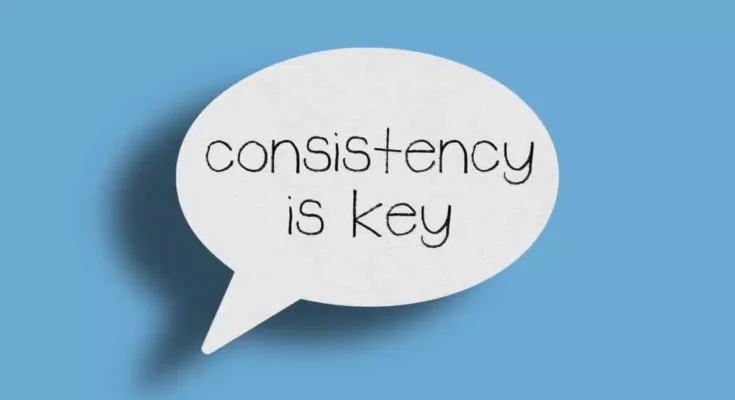In the dynamic and ever-evolving landscape of the business world, one trait often overlooked, yet fundamental to long-term success, is consistency. While innovative ideas, intelligence, and creativity undoubtedly play pivotal roles, consistency is what sustains a business, propelling it forward even during challenging times. Whether it’s establishing strong customer relationships, building a reliable team, or maintaining quality across products and services, consistency is the silent force that transforms ordinary efforts into extraordinary outcomes.
Understanding Consistency in Business
At its core, consistency in business means repeatedly delivering the same quality of service, maintaining professionalism, and upholding standards regardless of circumstances. It reflects a commitment to continuous improvement and the ability to meet expectations without fail. Consistency is not about perfection but about reliability.
A business that shows up regularly with quality products and services builds trust with its customers. Trust, once established, becomes the foundation of brand loyalty, word-of-mouth referrals, and sustainable growth. Consistency fosters predictability, which clients and partners value as it gives them confidence in your business’s ability to deliver.
The Role of Consistency in Building Trust and Reputation
In an increasingly competitive marketplace, trust is a key differentiator. Trust isn’t built overnight—it is earned through consistent actions, behavior, and results over time. When a business consistently delivers on its promises, it establishes a reputation for reliability. This reputation becomes the cornerstone of customer retention.
For instance, think about brands like Coca-Cola, McDonald’s, or Apple. These companies have mastered the art of consistency—whether it’s in product quality, customer service, or brand messaging. This consistency has helped them cultivate a loyal customer base that spans generations. People know what to expect from these brands, and that expectation leads to trust. In turn, trust fuels long-term success.
Driving Efficiency and Productivity
Consistency doesn’t only benefit customer relationships; it also significantly impacts internal operations. When processes, expectations, and standards are consistent, it fosters an environment where employees can work more efficiently and productively. Repeated actions develop habits, and those habits streamline processes. Teams become more proficient in their tasks, reducing errors, enhancing collaboration, and boosting overall performance.
Furthermore, consistent leadership creates a stable workplace culture. Employees are more likely to thrive when they understand what is expected of them, feel secure in their roles, and can rely on the organization’s stability. Leaders who are consistently transparent, supportive, and communicative build stronger, more motivated teams.
Consistency and Long-Term Growth
Many businesses fall into the trap of seeking quick wins, which can lead to erratic strategies or constant shifts in direction. While adaptability is important, frequent changes without a consistent underlying strategy can confuse customers and disorient employees. Long-term growth is the result of steady, incremental progress. Successful businesses understand that sustainable growth is built on the foundation of consistent actions, aligned with a long-term vision.
For example, think of successful companies that started small, gradually scaling over time. Amazon, now a global giant, began as an online bookstore in a garage. Through consistent effort, strategic expansion, and a relentless focus on customer satisfaction, it grew into the vast e-commerce platform it is today. The lesson here is clear: small, consistent actions can lead to exponential growth.
How to Build Consistency
While consistency may seem straightforward, it requires discipline, commitment, and a clear sense of purpose. Here are some steps to build consistency in your business:
- Define Your Values and Standards
Establish a set of core values and standards that define your brand. These should guide every decision, ensuring consistency across all aspects of your business—from customer interactions to product quality. - Create Systems and Processes
Develop systems and processes that allow for consistency. Standard operating procedures (SOPs), clear guidelines, and training programs ensure that employees understand and adhere to the same standards. - Lead by Example
Leadership plays a crucial role in setting the tone for consistency. Leaders who consistently model the behaviors they expect from their teams create a culture of accountability and reliability. - Set Long-Term Goals
Consistency is easier to achieve when you’re working toward well-defined long-term goals. By setting clear objectives, you ensure that your efforts remain aligned with your overarching vision. - Monitor and Adjust
While consistency is key, it’s also important to regularly assess and adjust your approach as needed. Ensure that your consistency isn’t leading to complacency. Continuous improvement should be a part of your consistent efforts.
Conclusion
In the business world, where change is the only constant, consistency might seem like an outdated principle. However, it remains one of the most powerful drivers of success. Businesses that prioritize consistency in their operations, customer relations, and growth strategies set themselves apart in a competitive market. It builds trust, enhances productivity, and paves the way for sustainable growth. As the adage goes, “Success doesn’t come from what you do occasionally; it comes from what you do consistently.” In this ever-evolving landscape, consistency is the bedrock upon which lasting success is built.




